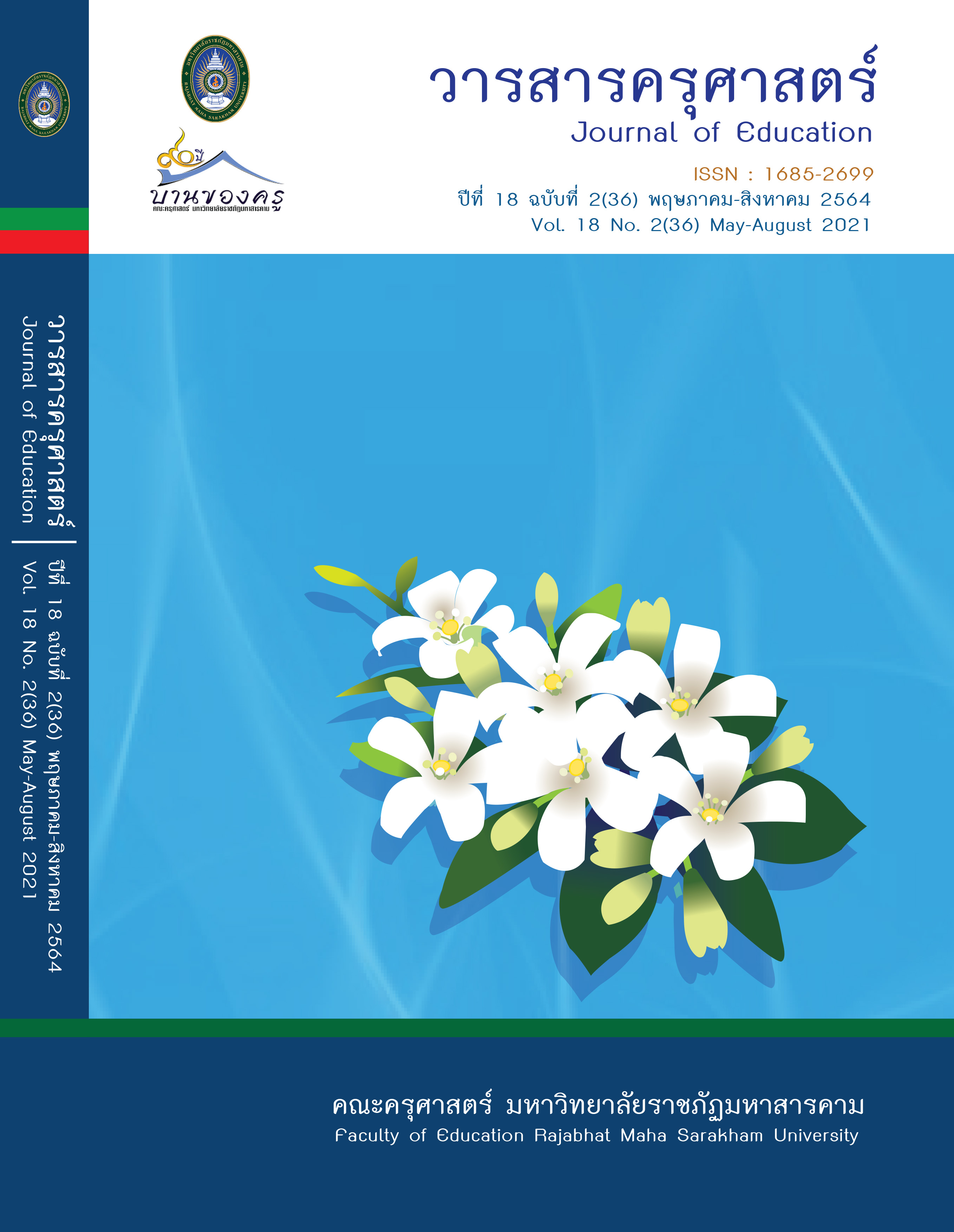The Development of Argumentative and Critical Thinking Abilities ofthe 8th Grade Students Using Learning Management Plans on Socio-Scientific Issue (SSI)
Main Article Content
Abstract
The purposes of this research were: 1) to compare the students’ argumentation abilities and critical thinking before and after the learning with the Socio-Scientific Issue (SSI) on Soil Water and Natural Disaster unit, 2) to study argumentation abilities and critical thinking in each aspect after the learning with the Socio-Scientific Issue (SSI) on Soil Water and Natural Disaster unit. The samples were 40 students in grade 8, Rajabhat MahaSarakham University Demonstration School, selected by purposive sampling. The research instruments were 1) 6 learning management plans with the SSI on Soil Water and Natural Disaster unit within 12 hours, 2) 3 sets of Argumentation Abilities Test, consistingeach of 5 items for the totalof 15 items, and 3) 20 items of the 3 multiple-choices on Critical Thinking Test. The data analysis was conducted by mean, standard deviation and percentage and t-test fordependent sample.
The results of this research revealed as follows: 1) the students had higher argumentation abilities and critical thinking after the learning with SSI than before the learning at statistical level of .05. 2) The students had the highest argumentation abilities on the claim; the lowest was the evidence.
Inaddition, they had the highest critical thinking on deductive, and the lowest wasinduction.
Article Details
ข้อกำหนดเบื้องต้นที่ผู้นิพนธ์(ผู้ส่งบทความ) ควรทราบ
1. ผู้นิพนธ์ที่ประสงค์จะลงตีพิมพ์บทความกับวารสาร ตั้งแต่เดือนมกราคม 2563 เป็นต้นไป ให้ใช้รูปแบบใหม่ (Template 2563) โดยสามารถดูตัวอย่างได้ที่เมนู GUIDELINES
2. จะตีพิมพ์และเผยแพร่ได้ ต้องผ่านการประเมินจากผู้ทรงคุณวุฒิ (Peer Review)
3. การประเมินบทความโดยผู้ทรงคุณวุฒิ (Peer Review) เป็นแบบ Double Blind
4. การอ้างอิงบทความใช้หลักเกณฑ์ APA (American Psychological Association) คลิก
5. บทความถูกปฏิเสธการตีพิมพ์ ไม่ผ่านการประเมิน ผู้นิพนธ์ขอยกเลิกเองหรือชำระเงินก่อนได้รับการอนุมัติ ทางวารสารไม่มีนโยบายการคืนเงิน
References
กฤษฎา ทองประไพ,ศศิเทพ ปิติพรเทพิน, กฤษณา ชินสิญจน์, และ อารยา แจ่มใส. (2559).การพัฒนาทักษะการโต้แย้งของนักเรียนชั้นมัธยมศึกษาปีที่ 2 ในหน่วยการเรียนรู้เรื่อง อาหารกับการดำรงชีวิต โดยการจัดการเรียนรู้โดยใช้ประเด็นทางสังคมที่เกี่ยวเนื่องกับวิทยาศาสตรเป็นฐาน.วารสารหน่วยวิจัยวิทยาศาสตร์ เทคโนโลยี และสิ่งแวดล้อม, 7(1), 59–60.
คณะกรรมการฝ่ายวิชาการ โรงเรียนสาธิตมหาวิทยาลัยราชภัฏมหาสารคาม. (2562, 12 มิถุนายน). รายงานผลสำฤทธิ์ประจำปีการศึกษา 2562. โรงเรียนสาธิตมหาวิทยาลัยราชภัฏมหาสารคาม.
ชัยวัฒน์ สุทธิรัตน์. (2552). 80 นวัตกรรมการจัดการเรียนรู้ที่เน้นผู้เรียนเป็นสำคัญ. แดเน็กซ์ อินเตอร์คอร์ปอเรชั่น.
ประสาท เนืองเฉลิม. (2558). การเรียนรู้วิทยาศาสตร์ในศตวรรษที่ 21.จุฬาลงกรณ์มหาวิทยาลัย.
ประสาท เนืองเฉลิม. (2551). การเรียนการสอนวิทยาศาสตร์ตามแนวคิด Socioscientific.วารสารศึกษาศาสตร์มหาวิทยาลัยมหาสารคาม,2(3), 99-105.
ยุภาวดี นุ่นปิ่นปักษ์,ชาติไทย แก้วทอง,และ จีระพรรณ สุขศรีงา. (2561), การเปรียบเทียบความสามารถในการโต้แย้งและการคิดวิพากษ์วิจารณ์จากการเรียนประเด็นปัญหาทางสังคมที่เกี่ยวกับการใช้วิทยาศาสตร์ระหว่างการเรียนรู้แบบผสมผสานตามรูปแบบสมองเป็นฐานกับการเรียนแบบปกติของนักเรียนชั้น ประถมศึกษาปีที่ 5 ที่มีเพศต่างกัน.วารสารวไลยอลงกรณ์ปริทัศน์ (มนุษยศาสตร์และสังคมศาสตร์),8(1), 73-74.
วิไลวรรณ ทรงศิลป์ และชาตรี ฝ่ายคำตา. (2560),การโต้แย้งทางวิทยาศาสตร์ของนักเรียนชั้นมัธยมศึกษาปีที่ 4 ในประเด็นทางสังคมที่เกี่ยวข้องกับวิทยาศาสตร์. วารสารมหาวิทยาลัยราชภัฏมหาสารคาม, 11(3), 175-184.
สถาบันทดสอบทางการศึกษาแห่งชาติ (2562). รายงานผลการทดสอบทางการศึกษาระดับชาติขั้นพื้นฐาน (O-NET) ชั้นมัธยมศึกษาปีที่ 3.http//www.niets.or.th.
สำนักวิจัยและพัฒนาการศึกษา(2559). รายงานการวิจัยแนวโน้มภาพอนาคตการศึกษาและการเรียนรู้ของไทยในปี พ.ศ. 2573.สำนักงานเลขาธิการสภาการศึกษา.
สุคนธ์ สินธพานนท์. (2552). นวัตกรรมการเรียนการสอนเพื่อพัฒนาคุณภาพของเยาวชน.เทคนิคพริ้นติ้ง.ศิขรินทร์ ธาร์โคตรสิงห์,ประวิต เอราวรรณ์, และ มนูญ ศิวารมย์.(2556).การพัฒนารูปแบบการสอนวิทยาศาสตร์โดยใช้ปัญหาเป็นฐานสำหรับพัฒนาทักษะกระบวนการคิดแก้ปัญหาของนักเรียนชั้นมัธยมศึกษาปีที่ 1. วิทยาการวิจัยและวิทยาการปัญญา,11(2), 42.
อัศวิน ธะนะปัด และคณะ.(2558). การพัฒนาทักษะการโต้แย้งของนักเรียนชั้นมัธยมศึกษาปีที่ 4 ในหน่วยการเรียนรู้ทรัพยากรธรรมชาติ โดยใช้การจัดการเรียนรู้ด้วยประเด็นทางสังคมที่เกี่ยวข้องกับวิทยาศาสตร์.วารสารวิจัย มข. มส. (บศ.),3(2), 1-9.
Dawson, V. M. & Venville, G. (2010). Teaching Strategies for Developing Students’ Argumentation Skills about Socioscientific Issues in High School Genetics. Research in Science Education, 40, 133 - 148.
Newton, P., Driver, R., and Osborne, J. (1999). Establishing the Norms of Scientific Argumentation in Classrooms.John Wiley& Sons.
Norris, S. P. & Ennis, R. H. (1989). Evaluating Critical Thinking (Practitioner Guide to Teaching Thinking Series).Midwest Publications.
Osborne, J. F. & Patterson, A. (2011). Scientific argument and explanation: A necessary distinction.Science Education.95, 636.
Pedretti, E. (1999). Decision making and STS education: exploring scientific knowledge and social responsibility in schools and science center through an issues-based approach.School Science and Mathematics, 99(4), 174-181.
Sadler, T. D. and Zeidler, D. L. (2003). Weighing in on Genetic Engineering and Morality :Students Reveal their Ideas Expectations, and Reservations. https://eric.ed.gov/?id=ED475162
Zeidler, D. L. & Sadler, T. D. (2011). Enacting a Socioscientific Issues Classroom: Transformative Transformations. Learning and Research, 88, 277-305.
Zoller,U.O. (1993). Expanding the Meaning of STS and the Movement Across the Globe. In R.E. Yager (Ed.). The Science , Technology , Society Movement. The National Science Teacher Association.


